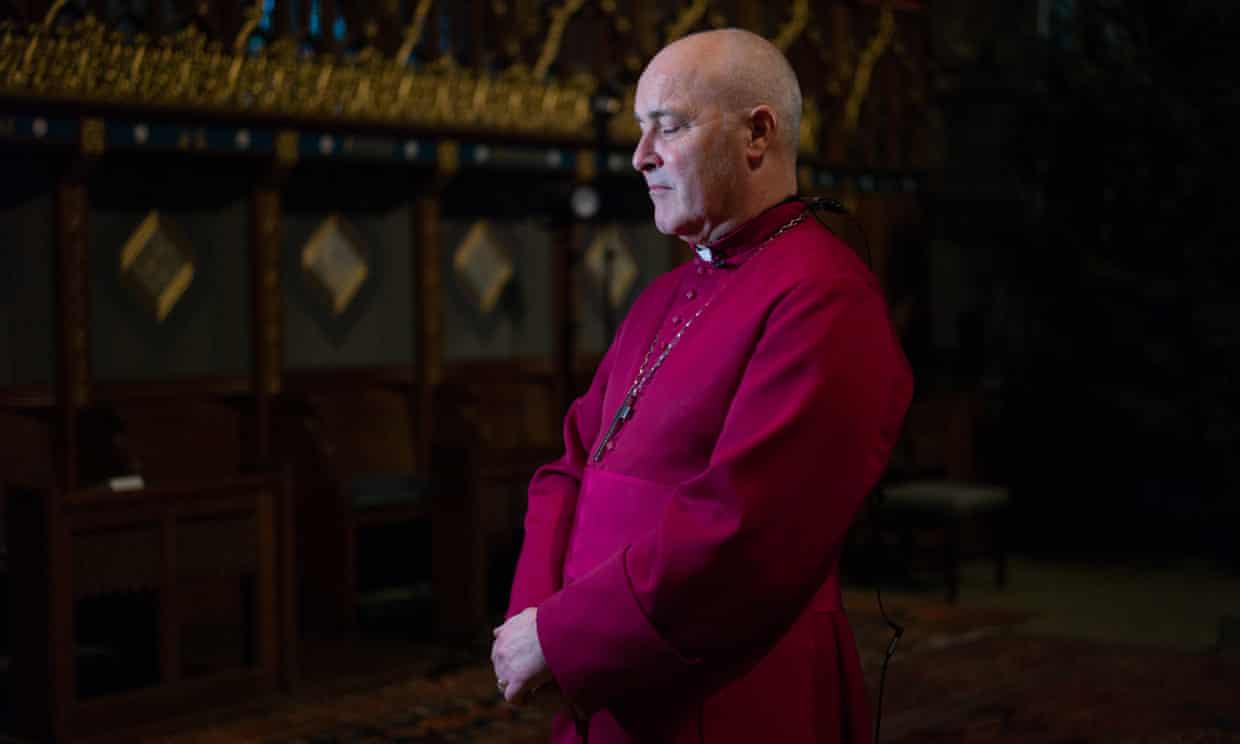
Coronavirus outbreak
Religious leaders plan events to remember UK coronavirus victims
Christians and Muslims say it will be necessary for people to come together to mourn
by Harriet SherwoodThe Church of England is planning to hold services of mourning in parish churches and cathedrals later this year for people who have died of Covid-19.
A national service of remembrance is also possible when large gatherings of people are permitted – possibly on the anniversary of lockdown next March.
Stephen Cottrell, the incoming archbishop of York, said: “Once we find ourselves at a place where the horrors of the pandemic are more likely to be behind us than in front of us, the Church of England does indeed plan to hold a number of services of mourning and remembrance for those who have died from Covid-19 and in thanksgiving for all those who have cared for them, especially in the NHS and in care homes up and down the country.”
The Commemoration of All Souls on 2 November is a possible date, he added. But, he said, no large national service of remembrance was planned at present, “though it is likely this may happen”.
Cottrell, who takes over as archbishop of York in July following John Sentamu’s retirement next week, said: “The government is unlikely to sanction any mass gathering of whatever kind for some months. Therefore, the holding of large national, regional or diocesan events is still some way off. Some have suggested something should be done next year on the anniversary of the lockdown beginning.”
The church was preparing “worship resources” for smaller family commemorations and services for local communities, he said.
“In the meantime those who are suffering, those who are dying, those who mourn and all those who care for them are prayed for each day,” said Cottrell, who will be confirmed as archbishop in a Zoom ceremony instead of a York Minster service.
There has been little debate so far in the UK about how to commemorate people who have died in the Covid pandemic. A minute’s silence for key workers who have died was held on 28 April.
Spain, where there have been more than 27,000 deaths, began 10 days of official mourning on Wednesday, with flags flying at half mast and a memorial ceremony presided over by King Felipe VI.
St Paul’s Cathedral opened an online book of remembrance earlier this month, and is planning a physical memorial in the north transept. In the first week, 3,147 names were entered in the memorial book.
David Ison, the dean of St Paul’s, said: “So many people across the country [have been] unable to say goodbye or mourn their loved ones in the usual ways. It has been incredibly moving to see the messages from family, friends and carers. It reminds us that every person who has died as a result of the Covid-19 pandemic is not merely a statistic in a health crisis – but a person, valued, missed and worthy of remembrance.”
In a recorded message, Prince Charles said the cathedral’s virtual memorial was a chance to mark “our loss and sorrow”.
Norwich Cathedral is holding a requiem Eucharist every Wednesday at which candles are lit for people who have died. The service is not open to the public, but people are invited to send in names of those they would like to be remembered.
Rose Hudson-Wilkin, the bishop of Dover, said she would “wholeheartedly support” the idea of a national memorial or period of mourning.
“This would be an act of solidarity with the many unable to grieve properly for those they have lost because of the necessary restrictions we have had to endure. Even those who have not lost loved ones may be experiencing grief – whether for the loss of jobs, or opportunities, or simply precious time with those they care for,” she said.
“In due time, as a nation we need to hold that grief up to the light, acknowledge it and share our pain with one another, as we look to the future with hope.”
Harun Khan, the secretary general of the Muslim Council of Britain, also backed the idea of a national event to remember Covid victims.
“The pandemic has proven itself to be an unprecedented experience, one that has shaken all our lives. Every day, we have been reminded of the fragility of life itself,” he said.
“It is necessary to mourn when one has suffered loss. As such, it remains of paramount importance that we rally, once again, to acknowledge this incalculable loss of life, come together to demonstrate our collective support for the families who mourn the loss of their loved ones and pay our respects to the many tens of thousands who have died.”